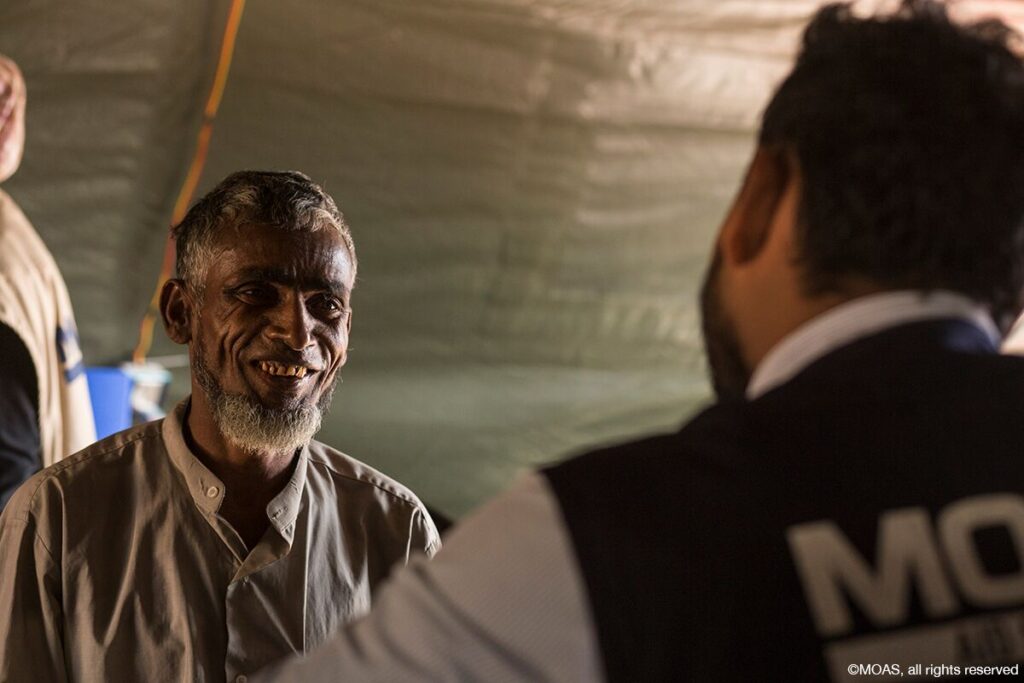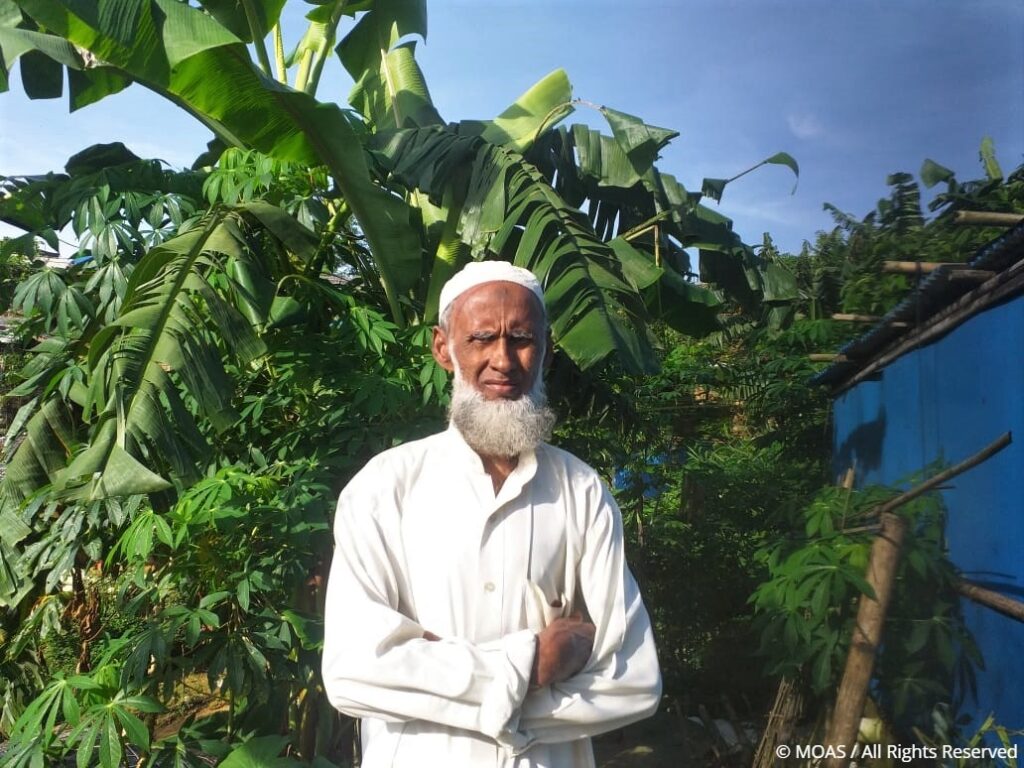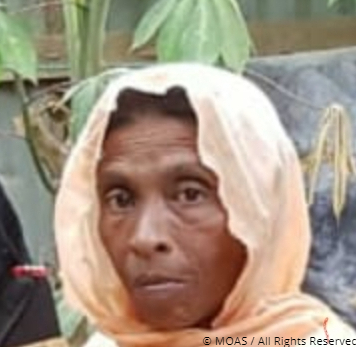On the 1st October each year, the International Day of Older Persons is celebrated to highlight the important contributions that older people make to society, and raise awareness of the opportunities and challenges of ageing in today’s world. 2020 has represented a particularly alarming time for older people across the globe due to the COVID-19 pandemic, which has caused disproportionate and severe impacts on the health, rights and wellbeing of the elderly.
Considering this occasion, we want to highlight the experiences and challenges faced by older persons living in refugee camps. Older people encounter particular obstacles during periods of crises and displacement, and those living in refugee camps often face problems including social isolation, chronic dependency, mobility issues and physical and mental health concerns. These issues have been highlighted in camps in Bangladesh for example, as many elderly Rohingya refugees living within them have reported difficulties in accessing basic healthcare and sanitation services, whilst the congestion and hilly terrain within the camps create a problematic environment, particularly for those with limited mobility. Yet, despite these difficulties, it is important that older refugees are not solely viewed as ‘passive, dependent recipients of assistance’, as they can also be assets to their community through serving as leaders, being valuable resources for guidance and advice, and acting as transmitters of culture and skills.
To further explore the experiences of older persons living in refugee camps, our field team in Bangladesh interviewed two Rohingya refugees over the age of 60 that live in the camps in Cox’s Bazar:
Mohammad, 68
Interviewer: How old are you now and how old were you when you arrived in the camp? How long have you been living in the camp?
Mohammad: I am 68 years old. I was 65 when I arrived in the camp. I have been living in the camp for three years.
I: Who do you live with?
M: I live with my son, son’s wife and grandchildren.
I: Was the journey to Bangladesh harder/longer because of your age?
M: Yes, of course. The journey was harder and longer for me because I am an old man.
I: What do you remember the most of that experience?
M: I remember one of the most grievous things is that halfway through my journey, a pregnant woman had delivered a nice baby. I am sure that she was in a severe situation. Luckily, both of them (mother and baby) were saved.
I: Did many other people of a similar age from your community also move to Bangladesh?
M: Yes, more than one hundred men my age (who are more than 60 years old) moved to Bangladesh from our community/village.
I: What is it like to live in the camp? Have there been any particularly notable days that you remember?
M: I don’t like to live in the camp. It’s like birds staying in cages but there’s nothing more to do, as it was our destiny. Yes, I can describe a day. It was on 25th August 2018. Many people gathered in a place in our camp and protested against the treatment we faced in Myanmar. I watched their activities from beside the road.
I: What are the main challenges you face here?
M: The main challenges we are facing right now are that we can’t teach our kids with standard education, we can’t do any farming in the camps as there are no big spaces here, it’s hard to support our families with limited food.
I: How do you feel your role/position in the community has changed since you came to Bangladesh?
M: Since I came to Bangladesh my role/position has changed totally as I was a renowned betel-nut businessman in Myanmar at my township, with that I was able to support my family well but here I can’t do any business due to lack of money.
I: How can humanitarian organisations better address the needs of elderly people living in the camps?
M: I think humanitarian organisations can better address the needs of elderly people who are living in the camps by showing mercy and encouraging higher authorities to take care of them. To do this, they can recommend making a list of the elderly people in each camp and giving monthly allowances, distributing blankets in cold seasons and distributing other necessary commodities. Then the importance of elderly people will raise in the home as well as in the camps.
I: What is it like to live in the camp during the rainy monsoon season?
M: In the rainy season we don’t feel good staying in the camp because it becomes very muddy and wet so that we can’t move from one camp to another and we can’t even go to mosques to say prayers and it becomes the worst for the aged people to move anywhere. Sometimes because of heavy rainfall, our shelters collapse, and landslides also happen. Small children are affected by pneumonia and pregnant women become sick from excessive coldness.
I: What would you want to teach the younger members of your community? Do you have any messages or advice you want to give them?
M: I just have some words to teach the younger people of our community, they should always stay united and keep focused on their full rights and to go back to motherland with dignity.
I: What has life been like in the camp since the outbreak of COVID-19? How has the pandemic affected your daily life?
M: It’s a more difficult life in the camp since the outbreak of COVID-19. The pandemic has affected us in many ways, such as we are getting less amount of foods compared to before, we can’t move anywhere freely during this period and we can’t even go to meet with our relatives, the people who have small business, they can’t go out to buy or sell their things, the people who always helped us before can’t help us now.
I: What are your hopes for the future?
M: We hope that we can go back to our motherland with full rights and get back our homeland and farmland.
Gul, 62
Interviewer: How old are you now and how old were you when you arrived in the camp? How long have you been living in the camp?
Gul: I am 62 years old. I was 59 when I arrived in Bangladesh. I have been living in the camp for three years.
I: Who do you live with?
G: I live with my son, son’s wife and grandchildren.
I: Was the journey to Bangladesh harder/longer because of your age? Who were you with on the crossing?
G: Yes, the journey was harder for me because I am an old lady. My son and two of my grandchildren were with me.
I: What do you remember the most of that experience?
G: I remember one of the most grievous things is that halfway through my journey, I was very hungry. We didn’t get any food and water. We ate trees leaves and drunk dirty water from a canal, it was a very hard experience in my life.
I: Did many other people of a similar age from your community also move to Bangladesh?
G: Yes, more than 70 women similar to my age (who are over 50 years old) moved to Bangladesh from our community.
I: What is it like to live in the camp? Have there been any particularly notable days that you remember?
G: I don’t like to live in camp. It’s a very hard life in the camp, like people staying in jail but we are obliged. Yes, I can describe a day. It was a day full of horror, an incident in November 2017. One day, at night around 9.00pm, a big wild elephant entered near our camp. Our whole family fled to another camp. It destroyed some huts including one learning centre. At 12.00 am, it went back to the big hills and then we tried to come back to our hut, but it was harder to find our hut as we were new arrivals. I still remember that day like it was today.
I: What are the main challenges you face here?
G: There are some common challenges we are facing now. Those are: not getting standard education, scarcity of enough food, improper treatment and narrowness of huts.
I: How do you feel your role/position in the community has changed since you came to Bangladesh?
G: Since I came to Bangladesh my role has changed. I used my farm to sow crops and took care of my domestic animals but here in Bangladesh, I can’t sow any crops due to lack of space.
I: What is it like to live in the camp during the rainy monsoon season?
G: We don’t feel good staying in the camp in rainy season. It becomes wet and all the roads become slippery so that people can’t move from one place to another. It becomes very tough for old women to move. Some old women get sick from excessive rainfall. Sometimes our grandchildren become ill and affected by pneumonia, coughs and fever. We are always at risk in the rainy season.
I: What would you want to teach the younger members of your community? Do you have any messages or advice you want to give them?
G: My message for our young members, everyone should obey the rules and regulations of the country they are presently living in. And respect their husband in a good manner.
I: What has life been like in the camp since the outbreak of COVID-19? How has the pandemic affected your daily life?
G: Life has become very difficult in the camp since the outbreak of COVID-19. During this pandemic period, our people can’t move anywhere, some day labourers, who live by hand to mouth, can’t get proper food. Some people haven’t even gone to hospital until now because of fear of coronavirus.
I: What are your hopes for the future?
G: I hope that one day I will go back to my motherland and die there.
Final thoughts
We are very thankful to our interviewees for providing us with these informative and revealing insights into their lives and experiences. On this International Day of Older Persons, MOAS is taking the opportunity to recognise the multitude of challenges that elderly people and their families face in refugee camps, and how these difficulties have been further aggravated by the effects of the COVID-19 pandemic in Bangladesh and beyond.
If you are interested in the work of MOAS and our partners, please follow us on social media, sign up to our newsletter and share our content. You can also reach out to us any time via [email protected]. If you want to support our operations, please give what you can at www.moas.eu/donate.




